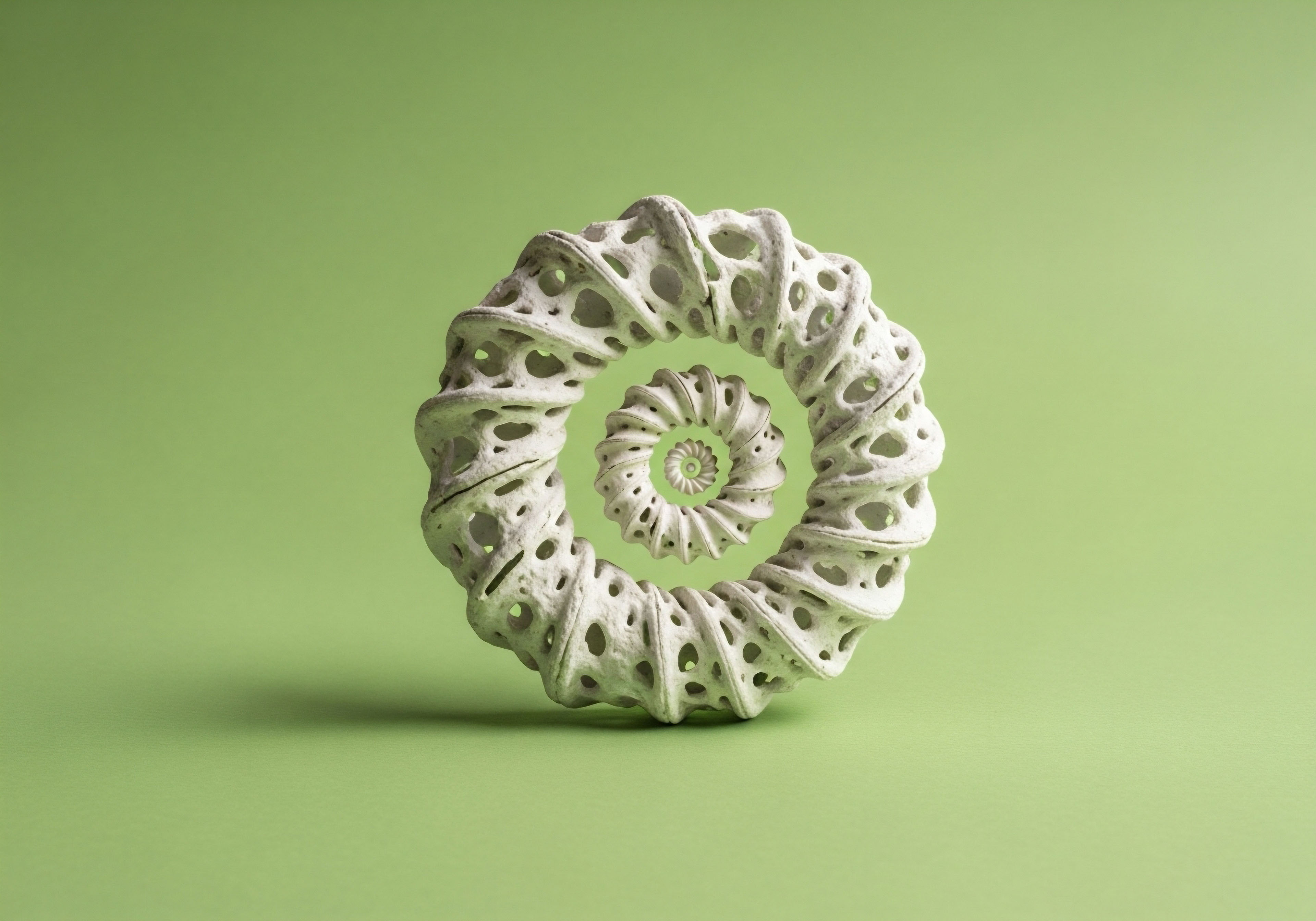

Fundamentals
You may be experiencing changes in your body that feel difficult to define. Perhaps it is a subtle shift in energy, a change in mood, or a difference in how your body holds weight. These experiences are valid and often point to deeper biological currents at play within your endocrine system.
Understanding how seemingly unrelated factors, like the bacteria in your gut, can influence your hormonal state is a critical step in reclaiming control over your well-being. The conversation about male hormonal health often centers on testosterone, yet the role of estrogen is equally significant for vitality and function. The way your body processes estrogen is a key part of this complex picture.
Your gut is home to a vast community of microorganisms, collectively known as the gut microbiome. This internal ecosystem performs a multitude of tasks that are essential for your health, including the regulation of hormones. Within this microbiome, a specialized group of bacteria, sometimes referred to as the “estrobolome,” produces an enzyme called beta-glucuronidase.
This enzyme plays a direct role in how your body metabolizes and eliminates estrogens. An imbalance in these gut bacteria can lead to either an excess or a deficiency of circulating estrogen, both of which can have profound effects on a man’s health.
The intricate balance of your gut bacteria directly influences how your body processes and regulates estrogen levels.
When the estrobolome is functioning optimally, it helps maintain a healthy balance of estrogens. However, when this microbial community is disrupted, a condition known as dysbiosis, the activity of beta-glucuronidase can be altered. Increased enzyme activity can lead to the reabsorption of estrogens that were meant to be excreted, raising their levels in the body.
Conversely, diminished activity can lead to an excessive elimination of estrogens, potentially lowering their levels. This modulation of estrogen metabolism by the gut microbiome highlights a critical connection between digestive health and hormonal balance.

The Gut-Hormone Connection
The relationship between your gut and your hormones is a dynamic, two-way street. Your hormonal state can influence the composition of your gut microbiome, and in turn, your gut microbiome can influence your hormonal state. This continuous feedback loop means that any intervention aimed at supporting one system will invariably affect the other.
Probiotics, which are live beneficial bacteria, represent a targeted approach to supporting the health of the gut microbiome. By introducing specific strains of bacteria, it is possible to favorably influence the composition and function of this internal ecosystem, and by extension, support a healthier hormonal balance.
The implications of this connection are significant for male health. Estrogen in men, while present in smaller quantities than in women, is essential for a variety of physiological functions, including bone health, cognitive function, and cardiovascular health.
An imbalance in estrogen levels, whether too high or too low, can contribute to a range of symptoms, from fatigue and mood swings to an increased risk of chronic diseases. Therefore, understanding the role of the gut microbiome in estrogen metabolism provides a new and powerful avenue for supporting overall male wellness.


Intermediate
For those already familiar with the foundational concepts of hormonal health, the next step is to understand the specific mechanisms through which probiotics can modulate estrogen metabolism. This involves a closer look at the biochemical pathways involved and the particular strains of bacteria that have been studied for their effects on the endocrine system.
The goal is to move from a general understanding of the gut-hormone axis to a more detailed appreciation of how targeted interventions can be used to support hormonal optimization.
The primary mechanism by which probiotics influence estrogen metabolism is through their effect on the enzyme beta-glucuronidase. As previously mentioned, this enzyme is responsible for deconjugating estrogens in the gut, a process that allows them to be reabsorbed into the bloodstream.
Certain strains of probiotics have been shown to modulate the activity of this enzyme, thereby influencing the amount of estrogen that is reabsorbed. For example, some strains of Lactobacillus and Bifidobacterium have been found to decrease the activity of beta-glucuronidase, leading to a greater excretion of estrogens and a potential reduction in circulating levels.
Specific probiotic strains can modulate the activity of beta-glucuronidase, the enzyme that governs estrogen reabsorption in the gut.
This modulation of beta-glucuronidase activity is a key element in the clinical application of probiotics for hormonal balance. For men with elevated estrogen levels, a common concern in the context of testosterone replacement therapy (TRT), the use of specific probiotic strains could offer a complementary strategy to traditional estrogen-blocking medications like Anastrozole.
By promoting the excretion of excess estrogen, these probiotics may help to mitigate some of the side effects associated with high estrogen levels, such as water retention and gynecomastia.

Probiotic Strains and Their Effects
While research in this area is still evolving, several probiotic strains have emerged as having potential benefits for hormonal health. The following table provides an overview of some of these strains and their studied effects:
| Probiotic Strain | Potential Effect on Estrogen Metabolism | Additional Potential Benefits |
|---|---|---|
| Lactobacillus acidophilus | May help reduce beta-glucuronidase activity | Supports overall gut health and digestion |
| Lactobacillus rhamnosus | May modulate the gut-brain axis, indirectly influencing hormonal balance | Supports immune function |
| Bifidobacterium longum | May help reduce beta-glucuronidase activity | Supports a healthy inflammatory response |
| Lactobacillus plantarum | May contribute to a healthier gut microbiome composition | Supports the integrity of the gut lining |
It is important to recognize that the effects of probiotics can be strain-specific. The benefits observed with one particular strain may not be applicable to others. Therefore, a targeted approach, based on the available scientific evidence, is essential when selecting a probiotic for hormonal support. Additionally, the response to probiotics can vary among individuals, influenced by factors such as their existing gut microbiome composition, diet, and overall health status.

Clinical Considerations for Probiotic Use
When considering the use of probiotics for hormonal health, several factors should be taken into account:
- Strain Specificity The choice of probiotic should be guided by the specific health goal. For estrogen metabolism, strains that have been shown to modulate beta-glucuronidase activity are of particular interest.
- Dosage and Duration The effective dosage and duration of probiotic supplementation can vary. It is advisable to follow the recommendations of a healthcare professional.
- Synergistic Interventions Probiotics are most effective when used as part of a comprehensive approach to health that includes a balanced diet, regular exercise, and stress management.


Academic
A sophisticated understanding of the interplay between probiotic strains and male estrogen metabolism requires a deep dive into the molecular and systemic mechanisms that govern this relationship. This exploration moves beyond the general concept of the estrobolome to examine the specific enzymatic and signaling pathways that are influenced by microbial interventions. From a systems-biology perspective, the gut microbiome functions as an endocrine organ, capable of synthesizing and metabolizing a wide range of bioactive compounds, including hormones.
The metabolism of estrogens is a complex process that occurs primarily in the liver, where they are conjugated to make them more water-soluble for excretion. These conjugated estrogens are then transported to the gut, where they can be deconjugated by bacterial beta-glucuronidase, leading to their reabsorption into the enterohepatic circulation.
The activity of this enzyme is a critical control point in estrogen homeostasis. Probiotics can influence this process not only by directly competing with beta-glucuronidase-producing bacteria but also by altering the overall gut environment, such as pH and the availability of nutrients, which can in turn affect enzymatic activity.
The gut microbiome’s role as an endocrine organ is central to understanding how probiotics can systemically influence hormonal balance.
Furthermore, the effects of probiotics on estrogen metabolism are not limited to their actions within the gut. The gut microbiome communicates with distant organs, including the liver and adipose tissue, through a variety of signaling molecules, such as short-chain fatty acids (SCFAs), secondary bile acids, and microbial-derived metabolites.
These molecules can enter the systemic circulation and influence gene expression and cellular function in these tissues, thereby affecting hormonal synthesis and metabolism at multiple levels. For example, SCFAs, which are produced by the fermentation of dietary fiber by gut bacteria, have been shown to have anti-inflammatory effects and to improve insulin sensitivity, both of which can indirectly support a healthier hormonal profile.

What Are the Implications for Male Endocrine Health?
The implications of these findings for male endocrine health are substantial. For men undergoing TRT, the co-administration of specific probiotics could potentially reduce the required dosage of aromatase inhibitors, such as Anastrozole, by promoting the excretion of excess estrogen. This could lead to a more favorable side-effect profile and a more balanced hormonal state.
Moreover, for men with conditions such as benign prostatic hyperplasia (BPH) or prostatitis, which are thought to be influenced by hormonal and inflammatory factors, the use of probiotics to modulate estrogen metabolism and reduce inflammation could offer a novel therapeutic approach.
The following table summarizes some of the key research findings on the effects of probiotics on male hormonal parameters:
| Study Population | Probiotic Intervention | Key Findings | Reference |
|---|---|---|---|
| Infertile men | Multi-strain probiotic | Significant increase in sperm concentration and motility; reduction in oxidative stress markers | |
| Men with IBS | Probiotic supplementation | Improvement in IBS symptoms, which may be correlated with improved sexual function | |
| General male population | Probiotic consumption | Potential for improved testosterone levels and sperm health (preliminary evidence) |

Future Directions in Research
While the current body of research is promising, further studies are needed to fully elucidate the role of specific probiotic strains in male estrogen metabolism. Future research should focus on:
- Strain-Specific Effects Identifying the most effective probiotic strains for modulating estrogen metabolism and the optimal dosages for clinical efficacy.
- Mechanistic Studies Elucidating the precise molecular mechanisms by which probiotics influence hormonal pathways, including their effects on gene expression and enzyme activity.
- Long-Term Clinical Trials Conducting large-scale, long-term clinical trials to evaluate the safety and efficacy of probiotics as a therapeutic intervention for hormonal imbalances in men.
The integration of probiotics into clinical practice for hormonal health represents a paradigm shift towards a more holistic and personalized approach to wellness. By targeting the gut microbiome, it is possible to influence the intricate network of hormonal signaling pathways that govern so many aspects of our physiology. This approach holds the potential to not only improve symptoms but also to address the root causes of hormonal imbalances, leading to a more profound and lasting state of health.

References
- Shin, J. & Kim, S. (2018). Roles of Sex Hormones and Gender in the Gut Microbiota. Journal of Neurogastroenterology and Motility, 24 (4), 544 ∞ 554.
- Ruscio, M. (2021). Probiotics for Men ∞ What the Research Shows (and Doesn’t Show). YouTube.
- Cleveland Clinic. (2020). Probiotics ∞ What They Are, Benefits & Side Effects. Cleveland Clinic.
- Helli, B. et al. (2022). Probiotic effects on sperm parameters, oxidative stress index, inflammatory factors and sex hormones in infertile men. Andrologia, 54 (10), e14526.
- Zhang, Y. et al. (2023). Association of probiotic ingestion with serum sex steroid hormones among pre- and postmenopausal women from the NHANES, 2013 ∞ 2016. Frontiers in Endocrinology, 14, 1264026.

Reflection
The information presented here offers a window into the complex and interconnected nature of your body’s systems. The knowledge that the microorganisms within you can influence your hormonal vitality is a powerful realization. This understanding is the first step on a path toward a more personalized and proactive approach to your health.
Your unique biology, your life experiences, and your personal goals all contribute to the narrative of your well-being. The journey to optimal health is a continuous process of learning, adapting, and making informed choices that align with your body’s innate intelligence. Consider how this new perspective on the gut-hormone connection might inform the next steps you take in your personal health journey.



